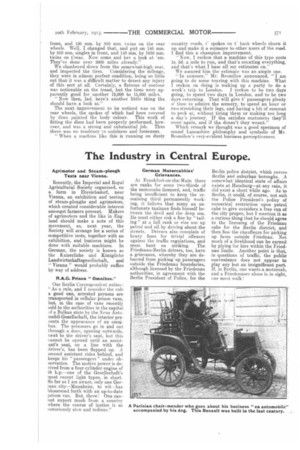The Industry in Central Europe.
Page 27

If you've noticed an error in this article please click here to report it so we can fix it.
Agrimotor and Steam-plough Tests near Vienna.
Recently, the Imperial and Royal Agricultural Society organized, on a farm in Ebreichsdorf, near Vienna, an exhibition and testing of steam-ploughs and agrimotors, which created considerable interest amongst farmers present. Makers of agrimotors and the like in England should make a note of this movement, as, next year, the Society will arrange for a series of competitive tests, together with an exhibition, and business might be done with suitable machines. In German, the society is known as the .Kaiserliche unci Konigliche Landwirtschaftsgesellschaft, and " Vienna " would probably suffice by way of address.
N.A.G. Prison "Omnibus."
Our Berlin Correspondent writes : "As a rule, and I consider the rule a good one, arrested persons are transported in cellular prison vans, but, in the case of vans recently sold to the authorities in the capital of a Balkan state by the Neue Automobil-Gesellschaft, the interior presents the appearance of an omnibus. The prisoners go in and out through a door, opening outwards, next to the driver's seat, but this cannot be opened until an assistant's seat, on a line with the driver's, has been flapped up. A second assistant rides behind, and keeps his " passengers" under observation. The motive power is derived from a four-cylinder engine of 28 h.p.--one of the Gesellschaft's most recent light types, in short. So far as I am aware, only one German city—Mannheim, to wit—has blossomed forth with an up-to-date prison van. But, there ! One cannot expect much from a country where the course of justice is so notoriously slow and tedious." German Motorcabbies' Grievances.
At Frankfort-on-the-Main there are ranks for some two-thirds of the motorcabs licensed, and, traffic being insufficient to keep the remaining third permanently working, it follows that many an unfortunate taximan finds himself between the devil and the deep sea. lie must either risk a fine by " tailing " at a full rank or else use up petrol and oil by driving about the streets. Drivers also complain of heavy fines for trivial offences against the traffic regulations, and seem bent on striking. The Friedenau-Berlin drivers, too, have a grievance, whereby they are debarred from picking up passengers outside the Priedenau boundaries, although licensed by the Friedenau authorities, in agreement. with the Berlin President of Police, for the
Berlin. police district, which covers. Berlin and suburban boroughs. A somewhat identical state of affairs exists at Hamburg—at any rate, it did exist a short while ago. As to Berlin, it could, of course, not suit the Police President's policy of numerical restriction upon petrol cabs to give outsiders a free run of the city proper, but I mention it as a curious thing that he should agree to the licensing of the Friednau cabs for the Berlin district, and then fine the chauffeurs for picking up fares outside Friednau. Not much of a livelihood can be earned by plying for hire within the Friednau limits. Another point is that, in questions of traffic, the public convenience does not appear to play any but an insignificant part. If, in Berlin, one wants a motorcab, and a Frieclenauer alone is in sight, one nitt1 walk!
































